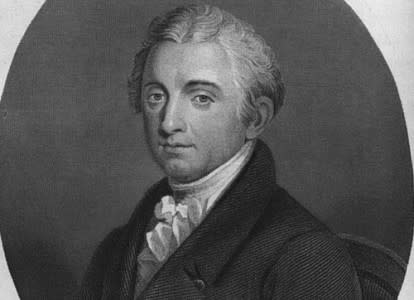The man who wrote the words “We The People”
Today marks the birth of maybe the most colorful of all the Founding Fathers. It was Gouverneur Morris who put the finishing touches on the Constitution in 1787, and gave the words “We The People” to all Americans.
Morris lived an interesting and well-rounded life. Born on January 31, 1752 in what is now the Bronx, Morris was part of a wealthy family in New York. He graduated from Kings College (later known as Columbia University) at the age of 16 and he passed the bar at the age of 19.
After some initial hesitation due to his social status, Morris embraced the Revolutionary cause. He was one of the youngest members of the Continental Congress and a signer of the Articles of Confederation. Morris wasn’t reappointed to the Continental Congress in 1779 and he moved to Philadelphia to eventually work with the financier of the Revolution, the unrelated Robert Morris.
Also in 1780, Morris lost a leg in a carriage accident.
In his new job in Philadelphia, Morris became very knowledgeable of the financial shortcomings of the new U.S. government, and by May 1787, when the delegates gathered in Philadelphia to write a new Constitution, Morris played a key role in the process.
In fact, Morris was the most vocal of all the Founders, speaking at the convention a total of 173 times – more than any delegate. In his speeches, Morris strongly supported religious freedom in the new nation, and he strongly condemned slavery.
He also wanted a strong central government that was guided by an elite class. At the end of the convention, Morris was one of five delegates chosen to write the actual document we know as the Constitution.
Historian Richard Brookhiser tells the story of how Morris crafted the Constitution’s Preamble in “Gentleman Revolutionary: Gouverneur Morris, the Rake Who Wrote the Constitution.”
“The Preamble was the one part of the Constitution that Morris wrote from scratch and here he showed creativity, and condensed thought,” said Brookhiser.
Brookhiser said historians are still debating if Morris fully understood how extensive some of his wording changes were to the draft Preamble, specifically naming “the People” and not the 13 states as the source of the government’s power.
Here is the draft version of the Preamble given to Morris in early August 1787:
“We the people of the states of New-Hampshire, Massachusetts, Rhode-Island and Providence Plantations, Connecticut, New-York, New-Jersey, Pennsylvania, Delaware, Maryland, Virginia, North-Carolina, South-Carolina, and Georgia, do ordain, declare and establish the following constitution for the government of ourselves and our posterity,” the draft Preamble read.
Once given the task of editing the Preamble, Morris took into consideration the various debates and arguments made in Philadelphia and offered this revised version:
“We the People of the United States, in Order to form a more perfect Union, establish Justice, insure domestic Tranquility, provide for the common defence, promote the general Welfare, and secure the Blessings of Liberty to ourselves and our Posterity, do ordain and establish this Constitution for the United States of America.”
Patrick Henry, a Patriot and prominent Anti-Federalist, attacked the words “We The People” during a debate with James Madison at Virginia’s convention to approve the Constitution.
“Who authorized them to speak the language of ‘We the People,’ instead of ‘We the States’?” Henry declared at the Virginia convention.
Madison countered with an argument that government should be established by the people.
“Should all the states adopt it, it will be then a government established by the thirteen states of America, not through the intervention of the legislatures, but by the people at large,” Madison said. “In this particular respect the distinction between the existing and the proposed governments is very material. The existing system has been derived from the dependent derivative authority of the legislatures of the states; whereas, this is derived from the superior power of the people.”
In later years it was also Madison, who documented the Constitutional Convention, who gave the credit to Morris as the “penman” of the Constitution, saying a “better choice” could not have been made.
After his considerable role in writing the Constitution, Morris turned down an invitation to join Madison and Alexander Hamilton as one of the writers of the Federalist papers. Instead, he went to France and became a witness to the French Revolution.
Morris remained in Europe until 1799, when he returned home and served briefly in the U.S. Senate. In his retirement years, Morris remained an ardent Federalist and opposed the War of 1812. He also led the effort to create the Erie Canal.
Morris died at his family home in New York in 1816 at the age of 64.
Recent Historical Stories on Constitution Daily
10 fascinating facts about young Franklin D. Roosevelt


